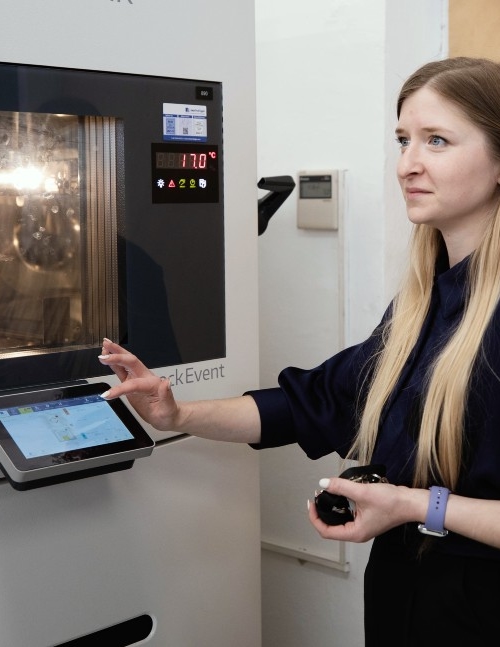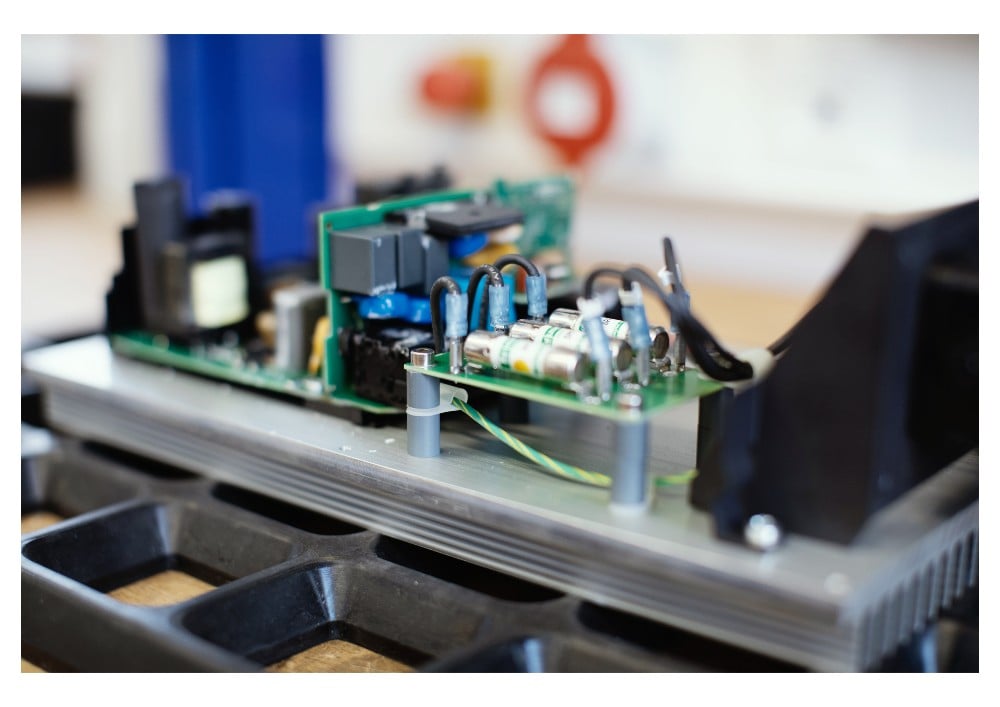
Comprehensive Battery Testing for International Standards
Receive a quote tailored to your needs
Battery Performance Testing
Our commitment is to ensure that batteries meet the strict performance, safety, and quality criteria set by international standards. Our laboratory holds accreditations from renowned organizations such as DAkkS and IECEE CB.
Why Certify Batteries?
Battery certification is vital to guarantee the safety and reliability of batteries used in diverse products and devices. Compliance with recognized standards, such as IEC 62133-2, IEC 62133-1, and IEC 62619, ensures batteries fulfill safety requirements.
These requirements are necessary for use in electric vehicles, consumer electronics, medical devices, and other applications. Certification provides assurance to end-users and regulatory bodies regarding battery safety and reliability. Failure to certify batteries can result in severe consequences, including product recalls and legal liabilities.
The EU has proposed a sustainable battery regulation. This regulation and other regulations aim to set sustainability criteria for battery production. These criteria include raw material sourcing and end-of-life disposal.
Compliance with these regulations is crucial, and certification helps minimize risks and liabilities associated with non-compliance. Battery manufacturers, distributors, and users should prioritize certification to guarantee product safety and reliability while staying updated on the latest requirements.

How Kiwa Can Help You
At Kiwa, we provide testing and certification for battery-related products. This includes cells, batteries, and battery storage systems. All of these services are fully accredited.
Our experienced specialists provide tailored testing services, helping you meet the required safety, quality, and performance criteria. Kiwa offers one-stop testing and certification services. It also ensures compliance with international standards.
Choose Kiwa for reliable testing and certification services that guarantee the sa fety and quality of your battery-related products.
We understand the importance of certification for battery manufacturers, distributors, and users. This is necessary to ensure the safety and reliability of their products.
We strive to stay up to date on the latest requirements. We offer tailored testing and certification services that are fully accredited. Our services are designed to save time, effort, and cost.
With Kiwa, you can trust that your battery-related products meet the required safety, quality, and performance criteria. Choose Kiwa for reliable testing and certification services that guarantee the safety and quality of your battery-related products.
Customer specific testing
At Kiwa Primara, we understand that our clients testing needs may go beyond standard industry requirements. That's why we offer customized testing services tailored to meet our clients specific needs and requirements.
We have advanced testing facilities and equipment. This enables us to conduct a variety of tests. These include humidity, salt spray, IP-Rate, thermal shock, water immersion and explosive atmosphere testing.
Our expert team is here to help. We can provide testing to comply with industry standards or to meet your specific needs. Contact us today to discuss your testing requirements and learn how we can assist you in achieving your testing goals.
Our Accreditations and Services: DAkkS accredited:
DAkkS accredited testing
The DAkkS accredited testing can be conducted for the following standards:
- IEC 62133-1 and IEC 62133-2 testing for Nickel and Lithium batteries and their cells used in portable end-products
- IEC 62619 testing for Lithium batteries and their cells for industrial applications
- IEC 63056 testing for secondary lithium cells and batteries for use in electrical energy storage systems
- IEC 63057 testing for Secondary lithium batteries for use in road vehicles not for propulsion
- UN38.3/IEC 62281 testing for transportation testing of Lithium Batteries
- IEC 61960-3 testing for performance testing of secondary cells and batteries
- IEC 62660-1/2/3 testing for Secondary lithium-ion cells for the propulsion of electric road vehicles
- IEC 61427 testing for the performance of secondary cells and Batteries for renewable energy storage
- RTCA DO 311A testing for minimum Performance Standards for Rechargeable Lithium Batteries and Battery Systems
Testing according to the UL standards
Via cooperation with a partner laboratory, Kiwa can offer you following UL standards:
- UL2271 for LEV application batteries
- UL1642 and UL2054 for primary and secondary lithium cells and batteries
- UL1973 for Stationary and Motive Auxiliary Power Applications batteries
IECEE CB accredited testing and certification
- IEC 62133-2 - Secondary cells and batteries containing alkaline or other non-acid electrolytes - Safety requirements for portable sealed secondary lithium cells, and for batteries made from them, for use in portable applications - Part 2: Lithium systems
- IEC 62619 - Secondary cells and batteries containing alkaline or other non-acid electrolytes - Transport of lithium-ion cells and batteries
- IEC 60086-1 - Primary batteries - Part 1: General
- IEC 60086-2 - Primary batteries - Part 2: Physical and electrical specifications
- IEC 60086-3 - Primary batteries - Part 3: Watch batteries
- IEC 60086-4 - Primary batteries - Part 4: Safety of lithium batteries
- IEC 60086-5 - Primary batteries - Part 5: Safety of batteries with aqueous electrolyte
- IEC 61960-3 - Secondary lithium-ion cells for use in industrial applications - Part 3: Safety requirements
- IEC 62281 - Safety of primary and secondary lithium cells and batteries during transport.
Cell Performance (ageing) testing
Battery cell aging is necessary to determine the lifespan and performance of the battery. This process involves exposing the battery to different environmental and other factors, like temperature and cycling. This simulates the effects of long-term use.
We can identify potential safety hazards by subjecting battery cells to certain conditions. Additionally, we can evaluate the impact of aging on battery capacity, internal resistance, and other critical parameters.
Our laboratory can provide numerous channels with up to 5 V. Each channel has a maximum current of 50 A. We can also apply 1000 A in parallel. Furthermore, we can apply different temperature profiles for ambient conditions.
We record and measure data on capacity and internal resistance. This provides a comprehensive evaluation of the battery's performance and aging characteristics.
The data collected from this process is then used to develop detailed models of the battery’s performance and aging characteristics. This information is used for multiple purposes. It helps inform future design decisions, optimize battery performance, and guarantee safety and reliability for the intended application.
Our laboratory is equipped with advanced testing capabilities. We can simulate various real-world scenarios, such as high temperature and repeated discharging and recharging. We can also simulate extreme conditions. This allows us to evaluate the battery’s performance under a wide range of environmental and other conditions.
UN38.3 Transportation testing
At Kiwa Primara, we understand that ensuring the safety and reliability of lithium batteries during transportation is essential. That's why we offer UN 38.3 Transport Test services to ensure that your batteries meet the required safety criteria. This test includes a total of eight individual tests that are dependent on the type of lithium battery or cell.
Individual tests according to UN38.3:
T1: Height Simulation / Altitude
T2: Thermal test
T3: Vibration
T4: Shock
T5: External short circuit
T6: Impact (cell)
T7: Overload test / Overcharge
T8: Forced discharge (cell)
We carry out tests to make sure your lithium batteries are safe to transport. This reduces the risk of accidents and ensures they comply with regulatory requirements.